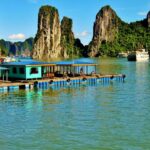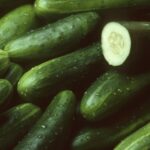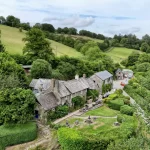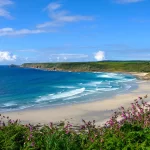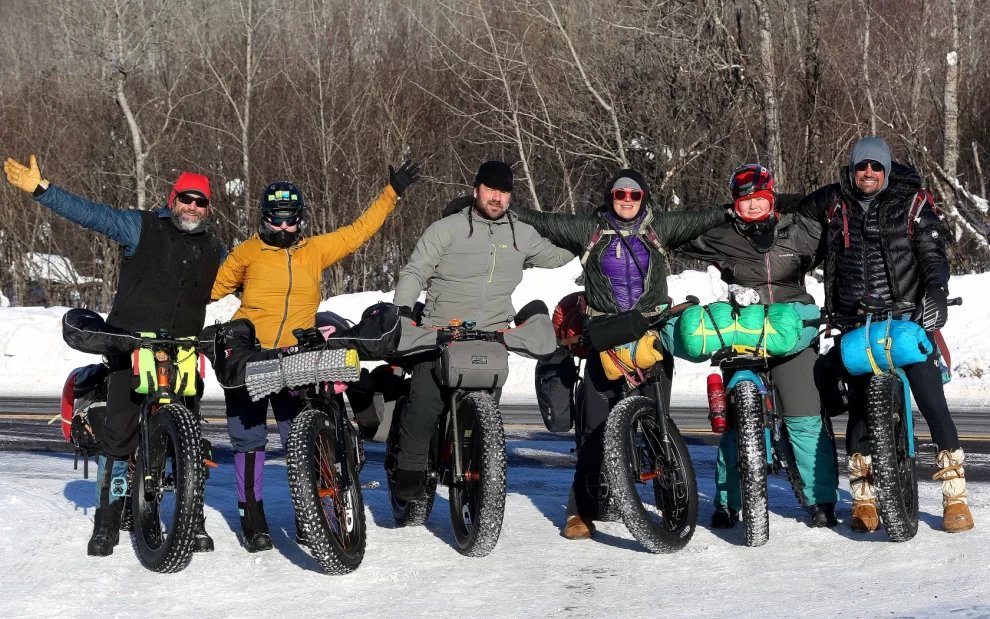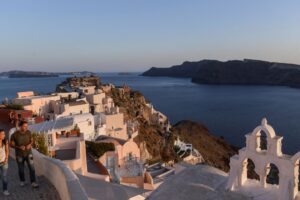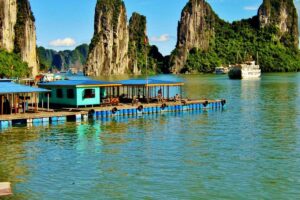“I’ve been out on that trail. I know what the hills are like, I know what the conditions are like. … I have so much respect for them,” Mallory Cummings of Duluth said.
On Saturday morning, 10 fat-tire bikers set out from Billy’s bar to ride the nearly 200 miles along the John Beargrease Sled Dog Marathon route.
While they’re not competing, they do aim to land at the Sawbill Trail checkpoint, ahead of the mushers and dogs, so they can help the teams for their mandatory three-hour rest.
“They’re out there doing what John Beargrease did — not on snowmobiles, not with dogs,” said Mallory Cummings of Duluth.
Cummings and her family have been spectating, serving or mushing the marathon for nearly 30 years.
She’s now on the board of directors, and said she heard about the Beargrease bikers from her father. Last summer, she connected with Ben Weaver, who began biking the route in 2019 , to hear more.
“My first thought is they’re a little crazy,” she recalled.
“Being a musher, I’d rather be on the back of a dog sled. However, I have so much respect for them. I’ve been out on that trail. I know what the hills are like, I know what the conditions are like.
“If the conditions change, the trail changes and can make it easier or much harder. They’re committed to riding in John Beargrease’s name,” Cummings continued.
Beargrease is the longest sled dog marathon in the lower 48 states, and the route follows the north shore of Lake Superior.
Biking along the route as a group has been a journey in understanding indigeneity and the Native narrative change, said Fond du Lac band member Alexandera Houchin.
“There’s this sled dog race and community around this huge event. We use a native person’s name, and I mostly never hear about who John Beargrease was,” she said.
Participating in this ride has changed what the race means for Houchin as a Native woman.
She thinks about what Beargrease experienced in 1854 territory as she pedals the land. “It’s taught me a lot, as a hyper competitive bike racer, that sometimes we have to slow down,” Houchin said.
For Weaver, these efforts help build community and are an intentional way of giving time, energy and spirit to the Beargrease legacy, the volunteers serving the race and the land.
“So much of outdoor activity is hierarchical, one-dimensional, and philosophically, for me, perpetuates the narrative that nature is other rather than we’re embedded in nature,” said Weaver. “This ride, for me and for all of us, is remembering and practicing that: We’re going deeper into ourselves and deeper into our relationship with nature.”
Weaver and Houchin are part of the core group of bikers, who ride about 60 miles per day to Grand Portage. They ride Saturday through Tuesday, and they camp Alpine-style, carrying all of their gear, food, first-aid and repair tools. They sleep in a bivy sack, similar to a giant rain jacket for your sleeping bag. They melt snow to resupply their water.
They’re completely self-supported, riding with everything they need to repair their bikes, first-aid kits, a GPS satellite tracker. There are latrines every 20-50 miles. (“Really cold toilet seats,” said Houchin.) And at night, they use headlamps, or the light from the stars, if it’s clear enough.
They’re intentional that their ride is human-powered, and each biker is responsible for having a plan to extract themselves in the case they can’t finish.
The terrain is rough, the total elevation change close to 15,000 feet up and down over 200 miles, much of that toward the end of the ride.
“We don’t have mountains here, but there’s so much of this that it really adds up,” said Weaver, angling his hand in an up-and-down formation. “It’s much more remote than people realize.”
Ben Weaver and Jay Petervary biked the route with a stop at Sawbill. There, they handed out a letter-printed poem Weaver wrote to John Beargrease to the checkpoint volunteers.
“We were two guys covered with ice,” recalled Weaver. “They gave us hot tang and bacon, and they made me read the poem out loud.”
From there, Weaver began building relationships and connections with the helpers, mushers and the dogs — and the bikers feel they relate more to the latter than anyone.
“If it’s fast for us, it means it’s fast for the dogs,” said Houchin.
Weaver has an arts and professionally sponsored cycling background.
The St. Paul poet / songwriter started with long rides in the Midwest to see how far they could go in the day and still play a show at night. That evolved into pedaling to Mississippi and around Lake Superior.
In 2018, Weaver biked 3,000 miles from Canada to New Mexico, performing shows along the way, which was included in the film “Music for Free.”
Houchin grew up far from her tribal community. She became an enrolled member in her 20s, and while she lives in Arizona, she still calls Cloquet home.
Her first long bike tour took her from Madison to the Fond du Lac Reservation, then from there to Boulder, Colorado. The trip opened her eyes to the complexity and simplicity of life when you’re on a bike, she said.
In 2018 and 2019, she won the Tour Divide , a 2,745-mile race.
In 2020, she was selected for a Lead For Minnesota Fellowship to increase access to bikes on the Fond du Lac Reservation, and in Carlton County.
Cycling put Houchin on the path of self-discovery, personally and culturally, and she left her desk job about a year ago to pursue a career as a full-time athlete.
“It started out as a vehicle, and ended up becoming one of the most important factors of my life — bikes and the people it brought me to,” she said.
What started as a reprieve from daily life for Houchin evolved into much more.
“I start to think about John Beargrease as a human … I started to think about the way that I relate to him. By riding along these trails, I feel like I’m honoring and experiencing some of the things he did.
“Everything changes, but we’re still here, we’re still Native people doing these cool things in the same place,” Houchin continued.
For Weaver, it’s humbling to reconnect to nature and to acknowledge the evolution in self and space as they revisit the same spaces on this ride every year.
It’s physically challenging, they said.
Avoiding overuse injuries is also vital. It’s a heavy bike, and riders spin their legs pretty fast to not tear up the snow.
But, there are so many more blessings than challenges.
One year, Houchin and Weaver saw a moose and its calf.
Another year, four of them pedaled next to each other on an 8-mile stretch, a treat, as they’re often single-file. For a half-hour, they were joined by four birds flying, weaving and crossing above and in front of them. “It really felt like it was us, as if we had wings,” recalled Houchin.
And highlight is that their efforts lead up to an “emotional and otherworldly” event seeing the dogs come down the hill and across Temperance River. The space is enveloped in fire and food, people from different backgrounds spectating and volunteering.
“It feels very human and how we’re meant to be, all working together, communicating, trusting, laughing, singing, eating bacon,” Weaver said.
The poem
John Beargrease
Even in the most remote nights
constellations are inherently
stories of relationships,
connected leaps of
failed domestication
hooking ground into sky.
Some of my ancestors were leaves,
flames, tamarack, and waxwings,
I feel their pull and hear their singing
through a fabric of organized chaos,
placed near the end of the rapids
sending a chorus of birch seed
and agate out on the tail
of each snow mote.
Don’t get thrown off the scent
mistaking simpler times
for lack of sophistication,
complex systems of mutual
dependency and survival
have always been woven
into the chains that bind life to earth,
the poverty of the current time is that
the miraculous leaps
between these links have come to be
considered burdens,
with curiosity and generosity held hostage
by a cultural entitlement to comfort.
When I hear the songs of my lupine
and snowshoe hare ancestors
I am pulled into the thick and pregnant
fogs of the land, where I am told stories
that remember,
when news from the outside
world came down the trail
behind a man on a sled
pulled by four dogs moving
at the pace of the land,
it was not a liability
to have an open heart,
it was an act of wildness.
– Ben Weaver
Source: Duluth News Tribune


